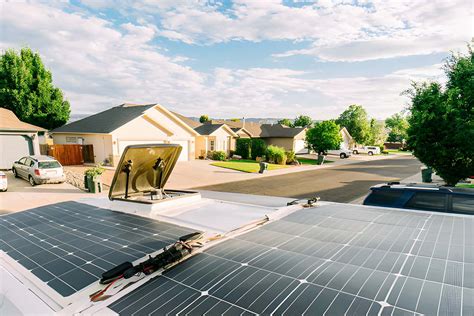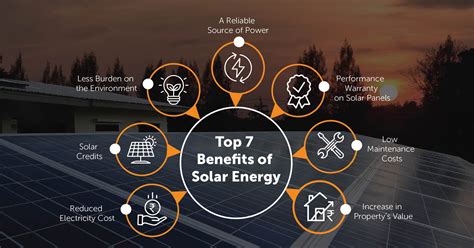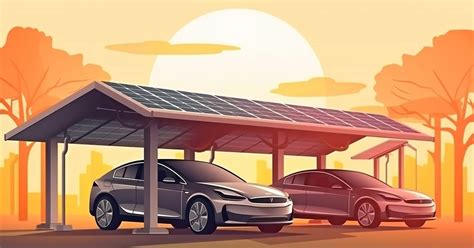Discover how solar energy reduces EV charging costs, boosts energy independence, and offers environmental and financial benefits through real-life case studies.As the world increasingly shifts towards sustainable energy solutions, electric vehicle (EV) owners are discovering the transformative benefits of powering their cars with solar energy. Imagine reducing your charging costs, contributing positively to the environment, and achieving greater energy independence – all while maximizing the efficiency of your EV. In this article, we will explore how integrating solar energy into your EV charging routine can significantly lower expenses, enhance your eco-friendliness, and provide long-term financial advantages. With real-life case studies and insights into cutting-edge solar technology, you’ll see how solar-powered charging is not just a trend, but a smart investment for both your wallet and the planet. Join us on this journey towards a greener future, where powering your EV with solar energy is both a practical and sustainable choice.
Understanding The Benefits Of Solar Energy For EV Charging
Utilizing solar energy for electric vehicle (EV) charging presents a multitude of advantages that enhance both financial savings and sustainability efforts. One of the most prominent benefits of solar energy is its potential to significantly lower charging costs. By harnessing solar power, EV owners can reduce their reliance on grid electricity, which often fluctuates in price and is subject to increasing rates over time.
In addition to cost savings, solar energy contributes to a lower carbon footprint. Using renewable resources for EV charging minimizes greenhouse gas emissions, aligning with global initiatives aimed at combating climate change. This aligns with the broader goal of creating cleaner, healthier environments, making it a vital component of sustainable transportation practices.
Furthermore, solar-powered EV charging systems offer a sense of energy independence. By generating electricity on-site, users are less vulnerable to power outages and fluctuations in energy supply, allowing for more reliable access to charging facilities. This decentralized approach empowers individuals and can lessen the environmental impact of traditional power generation methods.
Additionally, embracing solar technology for EV charging can enhance the overall efficiency of energy consumption. Solar panels convert sunlight directly into electricity, optimizing energy usage during peak sunlight hours, and allowing users to maximize their renewable energy sources.
The integration of solar energy with EV charging supports a more sustainable infrastructure, fostering innovation in energy technology and development. As more people recognize the benefits of this synergy, the demand will encourage further advancements in both solar technology and electric vehicle capabilities, paving the way for a cleaner, greener future.
How Solar Energy Reduces Your EV Charging Costs
One of the most compelling benefits of integrating solar energy into your electric vehicle (EV) charging routine is the significant reduction in your overall charging costs. Here’s how solar energy can help you save money:
| Charging Source | Average Cost per kWh | Estimated Monthly Savings |
|---|---|---|
| Traditional Grid Power | $0.13 – $0.20 | $50 – $90 |
| Solar Power | Free (after initial investment) | Up to $100+ |
By harnessing solar power for your EV, you can eliminate or drastically reduce the amount you pay to charge your vehicle. The upfront costs of solar panels can be offset over time, as you benefit from free electricity once the system is installed and paid off. Many states and regions also offer incentives and rebates for solar panel installations, further lowering initial expenses and enhancing your savings.
Moreover, as electricity prices fluctuate, having your own solar energy system insulating you from these changes can lead to consistent savings year-round. This shift not only reduces your direct charging costs but also aligns with broader benefits including energy independence and environmental sustainability.
Investing in solar-powered charging is akin to securing a long-term energy solution for your EV, offering substantial cost savings while contributing positively to your budget and lifestyle. As electric vehicle adoption continues to grow, the economic advantages of charging with solar energy become increasingly significant, making it a wise and forward-thinking choice.
The Environmental Benefits Of Powering Your EV With Solar
Powering your electric vehicle (EV) with solar energy offers a remarkable range of benefits for both individual consumers and the planet. As we transition towards a more sustainable future, the integration of solar power into EV charging is becoming increasingly vital. Here are some key environmental advantages:
- Reduction of Carbon Footprint: Charging your EV with solar energy significantly reduces greenhouse gas emissions. By utilizing renewable energy, you cut down on dependency on fossil fuels, which are a major contributor to climate change.
- Decreased Air Pollution: Traditional charging sources often release pollutants into the atmosphere. Solar energy, on the other hand, is clean and free of harmful emissions, leading to better air quality and a healthier environment.
- Conservation of Resources: Solar energy generation from photovoltaic cells requires minimal water compared to fossil fuel extraction and processing. As a result, using solar energy for EVs helps conserve valuable water resources.
- Promotion of Biodiversity: Transitioning to solar energy can help preserve natural habitats that would otherwise be disrupted by fossil fuel extraction activities. By opting for solar-powered EV charging, you contribute to protecting wildlife and promoting biodiversity.
The environmental impact of the benefits derived from harnessing solar energy for electric vehicle charging is profound. By choosing solar, you are not only enhancing your personal sustainability but also contributing to the overall health of our planet.
Increased Energy Independence Through Solar-Powered EV Charging
One of the most compelling benefits of using solar energy for EV charging is the increased energy independence it provides. By harnessing solar power, EV owners can generate their own electricity, reducing reliance on the grid and fossil fuels. This aspect is particularly vital in today’s world, where energy costs can fluctuate and supply security can be a concern.
When you power your electric vehicle with solar energy, you take control of your energy production. This self-sufficiency means that you’re less affected by local energy prices or energy crises. Instead of being at the mercy of utility companies and their pricing strategies, you can anticipate your EV charging costs with greater accuracy and stability.
Furthermore, during peak demand times, traditional electricity costs often spike. By using solar energy during these times, you avoid these premium costs. This alone can significantly lower your overall energy expenses related to EV charging.
To illustrate the energy independence gained through solar-powered EV charging, consider the following comparison in the table below:
| Scenario | Energy Source | Cost Effectiveness | Energy Control |
|---|---|---|---|
| Traditional Grid Charging | Non-renewable | Variable based on utility rates | Low |
| Solar-Powered Charging | Renewable | Consistent (often lower long-term costs) | High |
Transitioning to solar-powered EV charging not only makes financial sense but also fosters a sense of autonomy. The decreased reliance on traditional energy sources allows EV owners to better manage their energy use and contribute to a more sustainable future.
Maximizing Efficiency: The Benefits Of Solar Technology
When considering the integration of solar energy for electric vehicle (EV) charging, it’s essential to understand how solar technology can maximize efficiency and overall effectiveness. The benefits of using solar technology extend beyond mere electricity generation; they include enhancements in energy management, cost savings, and sustainability.
One of the primary advantages of solar technology is its ability to produce energy during peak sunlight hours, which often coincides with peak driving times for many EV users. By utilizing solar energy directly to charge your vehicle, you can optimize your charging schedule and reduce reliance on grid electricity—especially during high-rate peak times.
Additionally, advancements in solar panel technology have led to improved efficiency ratings, meaning that today’s solar systems can generate more power from less space. This increased efficiency not only results in lower installation costs per watt but also ensures that more energy can be captured and utilized for EV charging.
Another benefit of employing solar technology is the rise in energy storage solutions, such as batteries that store excess solar power generated during the day. This creates a reliable source of energy for charging your EV in the evening or on cloudy days, significantly enhancing your energy independence.
Moreover, the integration of smart technology with solar systems allows for improved energy management. Using smart meters and applications, users can track their energy consumption and solar production in real-time, optimizing their charging habits based on available solar energy. This not only maximizes the benefits of the generated solar power but also enhances overall efficiency in energy use.
Maximizing efficiency through solar technology leads to numerous advantages for EV owners. From reduced reliance on the grid and improved charging efficiency to increased energy independence and better management of resources, embracing solar technology significantly amplifies the benefits you can reap from both your EV and your energy consumption practices.
Long-Term Financial Benefits Of Using Solar Energy For EVs
Investing in solar energy for your electric vehicle (EV) charging offers significant long-term financial benefits. By harnessing the power of the sun, you can decrease your reliance on traditional energy sources, which can lead to substantial savings over time.
One of the most compelling aspects of using solar energy for EV charging is the reduction in energy costs. Once your solar panel system is installed, the sunlight it captures is free, significantly lowering your monthly electricity bills. In many cases, homeowners can eliminate their electricity costs altogether, resulting in long-term savings that can offset the initial investment in solar technology.
Furthermore, many regions offer incentives and rebates for solar energy installations. These financial incentives can dramatically lower the upfront costs associated with installing solar panels, allowing you to benefit from your investment much sooner.
Additionally, with the increasing popularity of EVs, many utility companies are now recognizing the demand for charging solutions and offering special rates or programs for solar-powered EV charging. This means you can enjoy cheaper rates for charging your EV using solar energy during off-peak hours, further enhancing your savings.
Moreover, a solar energy system can increase the overall value of your property. Homes with solar panels often have a higher market value, making it a smart long-term investment. When you decide to sell your home, prospective buyers may see the installed solar energy system as a bonus, allowing you to recoup costs and potentially profit from green technology.
Considering the rising prices of traditional energy sources and the increasing impact of climate change, investing in solar energy for your EV charging serves not only as a financially sound decision but also a hedge against future energy uncertainties. The long-term financial benefits of using solar energy for EVs make it an attractive option for environmentally conscious individuals looking to save money.
Real-Life Case Studies Demonstrating The Benefits Of Solar EV Charging
To truly understand The Benefits of powering your electric vehicle (EV) with solar energy, let’s explore some real-life case studies that highlight how individuals and organizations have leveraged solar technology to charge their EVs effectively.
One standout example is the case of a family in California who installed a solar panel system on their home. With an average monthly electricity bill of around $150, they decided to go solar in order to reduce costs and their carbon footprint. After installing a 5 kW solar array, they were able to charge their EV during the day using free solar power. As a result, their monthly energy costs dropped by over 60%, and they reported never needing to pay for electricity to charge their car.
Another notable case is a municipal fleet in a mid-sized city that transitioned to electric buses powered entirely by solar energy. By installing solar panels on the roof of their bus depot, the municipality was able to generate enough energy to not only charge their buses but also power the depot itself. This move resulted in significant operational savings, reducing fuel costs by nearly $100,000 annually while cutting greenhouse gas emissions substantially.
Moreover, a non-profit organization focused on environmental sustainability has showcased the benefits of solar EV charging through its community outreach program. They established several solar-powered EV charging stations in public parks, encouraging electric vehicle usage among locals. These stations not only provided a convenient charging option but also served as an educational tool, informing the community about renewable energy and its impact on reducing their overall carbon footprint.
A tech company in Seattle implemented a workplace charging program powered by solar energy for its employees. By investing in a rooftop solar system that not only served the building but also included EV chargers, employee satisfaction increased as they could conveniently charge their vehicles during the workday. The cost savings from reduced reliance on grid energy were substantial, further highlighting The Benefits of this sustainable approach.
These real-life examples clearly demonstrate how harnessing solar energy for EV charging not only generates financial savings but also contributes to environmental sustainability and energy independence. By transitioning to solar-powered EV charging, individuals and organizations can take concrete steps toward a greener future.
Frequently Asked Questions
The main benefits include reducing electricity costs, lowering carbon footprints, enhancing energy independence, and taking advantage of renewable energy to sustainably drive your EV.Solar energy allows EV owners to harness renewable power directly at home, which can significantly reduce reliance on grid electricity and improve the overall efficiency of transportation, especially when charging during peak sunlight hours.Charging an EV with solar energy drastically reduces greenhouse gas emissions compared to fossil fuel sources, contributing positively to the environment and combating climate change.Yes, solar panels can fully charge an EV, depending on factors such as panel size, sunlight exposure, battery capacity of the EV, and the efficiency of the solar setup.Incentives may include federal and state tax credits, rebates, grants, and net metering programs that help offset the costs of installation and provide ongoing savings on energy bills.Although upfront costs for solar systems can be significant, long-term savings on electricity bills, combined with government incentives, typically result in a favorable return on investment, especially for EV owners who charge frequently.Practical tips include assessing energy needs, investing in an adequate solar system size, considering battery storage for excess energy, participating in community solar programs, and regularly maintaining the solar panels to ensure optimal performance.











